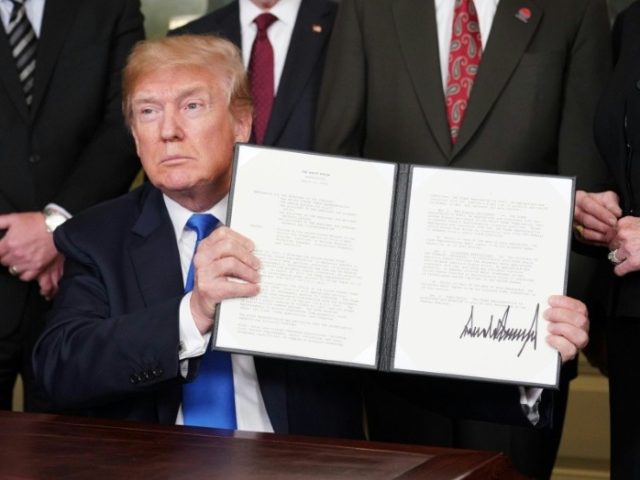Trump is starting a trade war, scream the headlines. But a closer look reveals that the President is simply trying to recover some of the losses suffered over the years by American companies at Beijing’s hands.
His new tariffs will specifically target Chinese products — hundreds may be named – that are manufactured using technology stolen or strong-armed from American companies.
These tariffs of 25 percent are going to be imposed on some $60 billion in imports. This sounds like a lot, but it is really only a tiny fraction of the $600 billion in intellectual property that the FBI estimates China steals from the U.S. annually.
To put it another way, China is walking off with the equivalent of the GDP of Ohio each year, while Trump is only asking for the equivalent of half of Vermont back.
Add this theft to China’s $500 billion-dollar trade surplus with the U.S., and it becomes clear that the predatory Chinese state and its operatives are making off with over a trillion dollars a year. It is for this reason that Trump wants China to commit to reducing the trade imbalance by $100 billion—to start.
Trump the businessman reads the bottom line of the U.S.-China balance sheet and sees a shocking trillion-dollar annual loss. “Unsustainable,” he says.
Trump the competitor understands that China is not just engaging in a trade war with the U.S., but an all-out contest for global economic dominance in the 21st century. “Make America Great Again,” he says.
The Chinese Party-State is engineering the largest transfer of wealth in human history with one overriding goal: to replace the United States as the dominant power on the planet.
If your enemy is at war with you, then you are at war, whether you want to be or not.
While dying industries and shuttered factories offer abundant evidence that America’s economy is being deliberately undermined, many of our economic and political elites argue that the worst thing we can do in the face of this ongoing assault is … fight back.
Imagine the ongoing economic competition between the U.S. and China as a boxing match for the world heavyweight title. We are 10 rounds into a 15 round match, and China has been beating America into a bloody pulp.
Round after round, China landed blow after blow as America played rope-a-dope.
As each round ends and America collapses on its stool, Washington’s cornermen move in. The advice of this gang of lobbyists, bankers, and academics is deliberately demoralizing. “We know you’re being hammered,” they say to a bruised and battered America. “But whatever you do, don’t fight back. That will only make China angry, and the beating your receiving at its hands will get even worse.”
All the while, to further discourage America from striking back, Beijing’s cornermen, including Premier Li Keqiang, are shouting from across the ring: “There is no winner in a trade war! There is no winner in a trade war!” (Remember the dictum of China’s ancient strategist Sun Tzu: All warfare is deception.)
Washington lobbyists may prattle on about “free trade” — a theoretical ideal which only exists in the minds of economists –but they are really worried about their own bottom lines. After all, the big importers line their pockets by lining the shelves of their stores with cheap, Chinese-made goods. And Main Street’s loss is, paradoxically, Wall Street’s gain. America’s financial sector is busy brokering investments for Chinese companies and individuals flush with the profits from their country’s cheating.
Successive former presidential administrations have wrung their hands over China’s cheating but did nothing.
Phil Levy, who was a trade advisor to President George W. Bush, has criticized the sitting president for being “excessively eager to apply tariffs,” even though the current negotiations have already dragged on for over a year. While Levy acknowledges Chinese thefts of intellectual property, he nevertheless insists that there are “much more effective ways [besides tariffs] to address them.”
Really? If such “effective ways” really existed, then the obvious question is: why weren’t they used during the eight years of the Bush administration to resolve the problem?
Instead, the can was simply kicked down the road. Bush’s successor proved to be even weaker on China. Former president Barack Obama, who apparently believed that the sheer force of his rhetoric was enough to move mountains, tried to jawbone China’s leaders into practicing fair trade. The result of his ineffectual leadership was that the U.S. trade deficit with China almost doubled on his watch.
Now we have, in a town famous for its talk, a man of action in the White House.
Trump is not the first president who has promised to do something about China, just as he is not the first president who has promised to move the U.S. Embassy to Jerusalem.
Every president back to Clinton has promised to do both. Every president until now has failed to do either.
This May 14th, the new U.S. Embassy in Jerusalem will open. And over the next few weeks, hundreds of Chinese knock-offs based on stolen American technology will have a 25 percent tariff imposed on them.
Will this lead to a wider trade war? I think it highly unlikely.
China is promising to impose a few tariffs of its own, largely to save face, but I expect that Beijing will quickly cave in the face of Trumpian resolve.
After all, President-for-Life Xi Jinping knows that China’s export-dependent economy has far more to lose in an all-out trade war than America’s more self-sufficient one does.
More importantly, he knows that President Donald J. Trump, an American original, knows it too.
Steven W. Mosher is the President of the Population Research Institute and the author of Bully of Asia: Why China’s Dream is the New Threat to World Order.

COMMENTS
Please let us know if you're having issues with commenting.